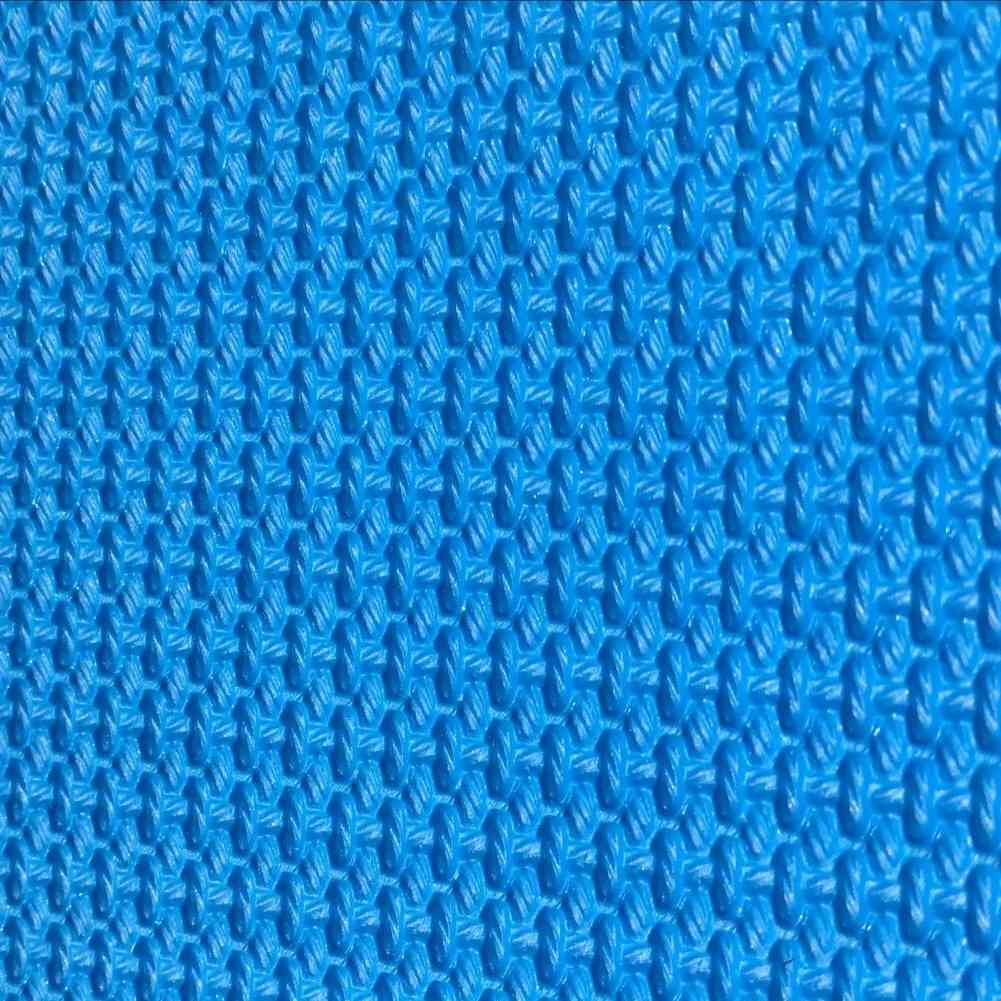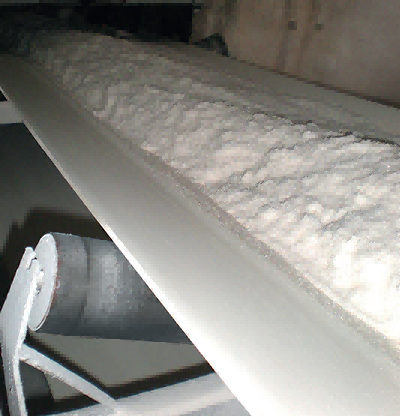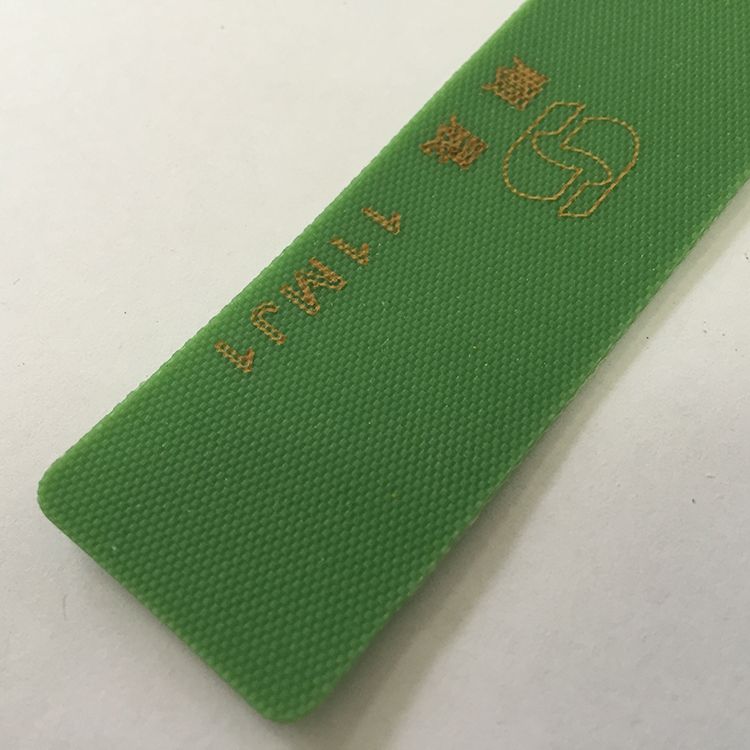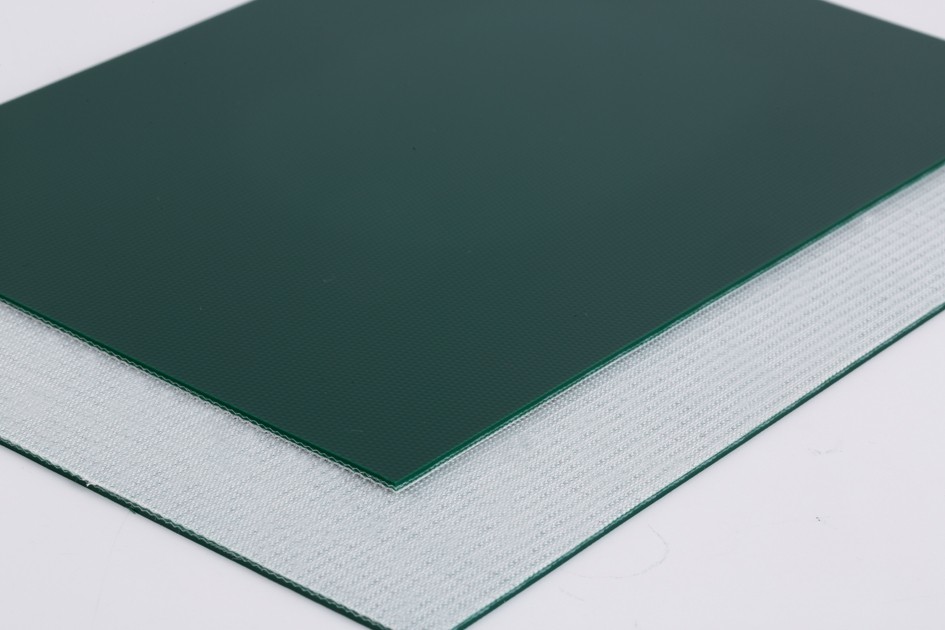ソリッドPVCコンベアベルト は、ポリ塩化ビニル(PVC)材料と織物構造で作られたコンベヤベルトで、強い耐久性と柔軟性を持っています。この種のコンベヤベルトは通常、高強度PVC材料を採用し、耐摩耗性、耐腐食性に優れ、過酷な環境での長期使用に適しています。表面は滑らかで安定しており、効果的に摩擦を減らし、搬送効率を向上させることができます。織物構造の特別な設計により、このコンベヤベルトは高荷重に耐え、高荷重と複雑な地形の下でも優れた搬送性能を維持することができます。
メリット
ソリッドPVCコンベアベルトは、他の種類のコンベアベルト(ゴムコンベアベルト、スチールコンベアベルト、ポリエステル/ナイロンコンベアベルトなど)よりも、特に耐久性、柔軟性、清潔性、環境保護の面でいくつかのユニークな利点があります。
ゴム製コンベアベルトとの比較
- 耐食性:PVC素材は化学的腐食、油分、水分に対する耐性が高いため、食品加工や化学処理など腐食防止が必要な場所で優れた性能を発揮します。対照的に、ゴム製コンベヤベルトは、油脂や化学薬品が使用される環境では劣化や老化が起こりやすい。
- 清掃性:PVCソリッドコンベアベルトは表面が滑らかで、清掃が簡単で、特に食品、薬品など衛生要求の高い業界に適している。ゴムコンベヤベルトの表面は比較的粗く、汚れがたまりやすく、メンテナンスと清掃が必要です。
- 重量と柔軟性:PVCコンベアベルトは通常、ゴム製コンベアベルトより軽く、柔軟性に優れ、高い柔軟性を必要とする輸送システムに適している。ゴムベルトは厚く、柔軟性に劣り、重量物輸送に適している。
スチール製コンベヤベルトとの比較
- 重量:スチールコンベアベルトは、その金属材料のために通常重いですし、インストールおよび保守がより複雑です。それに比べ、PVC織物コンベヤベルトは軽量で、設置や操作が簡単で、輸送や操作のエネルギー消費を効果的に削減することができます。
- 耐食性:スチールコンベヤベルトは湿気、酸化、腐食などの影響を受けやすく、定期的なメンテナンスと防錆処理が必要です。PVCコンベヤベルトは耐食性に優れ、様々な過酷な環境、特に湿度や化学物質の多い環境下でも長期間安定して使用することができます。
- コスト:スチールコンベアベルトはイニシャルコストが高く、複雑な設置やメンテナンスが必要です。PVC織物コンベヤベルトは比較的経済的で、メンテナンスも簡単で、大規模な使用に適しています。
ポリエステル/ナイロンコンベアベルトとの比較
- 耐摩耗性と引張強度:ポリエステル/ナイロンコンベアベルトは強度と耐摩耗性に優れていますが、PVCソリッド織物コンベアベルトは耐食性と耐油性でより多くの利点があり、特に高い衛生基準を必要とする産業(食品、医薬品など)で使用されています。
- 温度耐性:ポリエステル/ナイロンベルトは高温環境下で変形しやすく、強度が低下しやすいのに対して、PVC織物コンベアベルトは高温環境下でも比較的安定しており、温度変化の大きいさまざまな用途に適しています。
- 耐薬品性ポリエステルやナイロンのコンベヤベルトはこれらの化学薬品に対する耐性が低く、破損しやすい。
- 環境保護:PVC素材はそれ自体がリサイクル可能で、環境保護の要件を満たしている。ナイロンやポリエステル素材は環境保護にやや劣り、生産工程や廃棄物処理工程で環境への負荷が大きくなる可能性がある。

の耐久性と寿命に影響を与える要因 ソリッドPVCコンベアベルト
- 利用環境:高温、多湿、化学薬品などの過酷な環境は、PVC素材の老化や損傷を早め、耐用年数を縮めます。
- 負荷と動作周波数:過度の負荷や頻繁な高速運転は、コンベアベルトの摩耗を増加させ、材料疲労を引き起こし、寿命を縮めます。
- クリーニングとメンテナンス:定期的な清掃と適切なメンテナンスにより、ゴミの堆積や腐食を防ぎ、コンベアベルトの寿命を延ばすことができます。
- 表面コーティング:PVC表面コーティングの品質は、耐摩耗性と耐腐食性に直接影響します。高品質のコーティングは、効果的にコンベヤベルトを保護し、その耐久性を延ばすことができます。
- 設置方法:締め付けすぎや不均衡な張力など、不適切な取り付けはコンベアベルトの変形や破損の原因となり、長期使用に影響します。
アプリケーション・シナリオ
ソリッドPVC織物コンベヤベルトは、その耐摩耗性、耐腐食性、および容易なクリーニング特性により、多くの産業で広く使用されています。様々な原材料や完成品を効率的に搬送できる食品加工業界で広く使用されています。滑らかな表面は衛生基準を満たし、細菌の繁殖を防ぐため、肉、野菜、果物、スナック菓子の加工に特に適している。包装産業でも、ボトル、箱、袋などの包装品を効率的に搬送するためにこのタイプのコンベアベルトが使用されており、自動化された生産ラインの高速運転に適しています。
物流と倉庫の分野では、固体織PVCコンベヤベルトは、小包や商品の輸送に広く使用されています。耐摩耗性、耐油性に優れ、長期間の搬送作業に適しています。電子機器製造業では、精密電子部品の搬送によく使用されます。表面が滑らかなため部品を傷つけることがなく、組立ラインや検査ラインでの使用に非常に適しています。また、化学業界では、化学薬品、粉体、粒体の搬送にPVCコンベアベルトがよく使用されます。耐薬品性に優れているため、長期にわたって安定した操業が可能です。
ソリッドPVC織物コンベヤベルトは、鉱業や重工業でも広く使用されており、鉱石や石炭などのバルク材料を効率的に輸送することができ、重い荷重や過酷な作業環境に適しています。製薬業界では、このタイプのコンベヤベルトは医薬品製造ラインや包装ラインで使用され、高い衛生要件を満たすことから好まれています。また、清掃業界では、表面の清掃が容易で汚れがたまりにくいことから、ゴミの分別や運搬に塩ビ織物コンベヤベルトがよく使用されています。一般的に、PVC織布コンベヤベルトは優れた性能を持ち、広く多業界で使用され、生産効率と輸送の安全性を向上させます。





